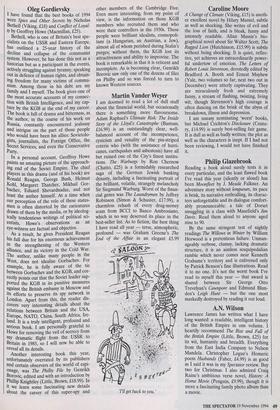Oleg Gordievsky
I have found that the best books of 1994 were Spies and Other Secrets by Nicholas Bethell (Viking, £18) and Conflict of Loyal- y by Geoffrey Howe (Macmillan, £25). Bethell, who is one of Britain's best spe- cialists on the USSR and Eastern Europe, has outlined a 25-year history of the decline and collapse of the communist system. However, he has done this not as a historian but as a participant in the events, actively struggling against tyranny, speaking out in defence of human rights, and obtain- ing freedom for many victims of commu- nism. Among those in his debt are my family and I myself. The book gives one of the most accurate accounts of my connec- tion with British Intelligence, and my cap- ture by the KGB at the end of my career. The book is full of drama and bitterness, as the author, in the course of his work on Russia, constantly encountered jealousy and intrigue on the part of those people who would have been his allies: Sovietolo- gists, journalists, the Foreign Office, the Secret Services, and even the Conservative Party.
In a personal account, Geoffrey Howe Paints an amazing picture of the approach- ing end of the Soviet Empire. The chief players in this drama (and of his book) are Ronald Reagan, George Bush, Helmut Kohl, Margaret Thatcher, Mikhail Gor- bachev, Eduard Shevardnadze, and not least the author himself. At a time when our perception of the role of these states- men is often distorted by the caricatures drawn of them by the media, or by ideolog- ically tendentious writings of political sci- entists, Howe's observations as an eye-witness are factual and objective.
As a result, he gives President Reagan his full due for his enormous achievement in the strengthening of the Western alliance, and its victory in the Cold War. The author, unlike many people in the West, does not idealise Gorbachev. For example, he is fully aware of the tie between Gorbachev and the KGB, and cor- rectly points out that the Soviet leader sup- ported the KGB in its punitive measures against the British embassy in Moscow and its efforts to preserve its spy network in London. Apart from this, the reader dis- covers very interesting details about the relations between Britain and the USA, Europe, NATO, China, South Africa, Ire- land. It is a truly intelligent, profound and serious book. I am personally grateful to Howe for removing the veil of secrecy from my dramatic flight from the USSR to Britain in 1985, so I will now be able to reveal all its details.
Another interesting book this year, unfortunately overrated by its publishers and certain observers of the world of espi- onage, was The Philby File by Genrikh Borovic, edited and with an introduction by Phillip Knightley (Little, Brown, £18.99). In it we learn some fascinating new details about the career of this super-spy and other members of the Cambridge Five. Even more interesting, from my point of view, is the information on those KGB members who recruited them and who were their controllers in the 1930s. These people were brilliant idealists, cosmopoli- tans (a Hungarian, an Austrian, a Jew), almost all of whom perished during Stalin's purges; without them, the KGB lost its attractiveness and ability to improvise. The book is remarkable in that it is reticent and incomplete. As is becoming clear, Genrikh Borovic saw only one of the dozens of files on Philby and so was forced to turn to known Western sources.


















































































 Previous page
Previous page